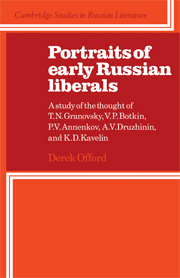 Portraits of Early Russian Liberals
Portraits of Early Russian Liberals Book contents
- Frontmatter
- Contents
- Foreword
- Note on dates, transliteration and use of Russian terms
- 1 Russian intellectual life in the 1840s and 1850s
- 2 Timofey Nikolayevich Granovsky (1813–1855)
- 3 Vasiliy Petrovich Botkin (1811–1869)
- 4 Pavel Vasilyevich Annenkov (1813–1887)
- 5 Aleksandr Vasilyevich Druzhinin (1824–1864)
- 6 Konstantin Dmitriyevich Kavelin (1818–1885)
- Conclusion
- Key to abbreviations used in the notes
- Notes
- Selected bibliography
- Index
5 - Aleksandr Vasilyevich Druzhinin (1824–1864)
Published online by Cambridge University Press: 06 July 2010
- Frontmatter
- Contents
- Foreword
- Note on dates, transliteration and use of Russian terms
- 1 Russian intellectual life in the 1840s and 1850s
- 2 Timofey Nikolayevich Granovsky (1813–1855)
- 3 Vasiliy Petrovich Botkin (1811–1869)
- 4 Pavel Vasilyevich Annenkov (1813–1887)
- 5 Aleksandr Vasilyevich Druzhinin (1824–1864)
- 6 Konstantin Dmitriyevich Kavelin (1818–1885)
- Conclusion
- Key to abbreviations used in the notes
- Notes
- Selected bibliography
- Index
Summary
Judgements of Druzhinin by Soviet scholars and by his contemporaries
Aleksandr Vasilyevich Druzhinin, a younger man than Granovsky, Botkin and Annenkov (he was born in 1824), did not belong to that generation which came to maturity in the bleak years following the abortive Decembrist uprising and which passionately embraced and then rejected German philosophy in the late 1830s and early 1840s. (Indeed, he made no impact on Russian intellectual life until the publication of his novella, Polinka Saks, in 1847.) Rather he was the product of the intellectual ferment that Granovsky, Botkin and Annenkov had themselves helped to create. Furthermore, the nature of his contribution to Russian intellectual life in the middle of the nineteenth century was qualitatively different from that of the slightly older men. Whereas Granovsky exerted his influence mainly through the medium of historical scholarship, and Botkin and Annenkov, as dilettanti with broad cultural interests, made few outstanding contributions in any particular field, Druzhinin excelled as a literary critic. It was in this role that he broadly represented the liberal ‘men of the 1840s’ when in the mid 1850s they came to defend the integrity of art against Chernyshevsky and Dobrolyubov, who were beginning to make utilitarian demands of it. Since literary criticism, moreover, was the arena in which the contest between the liberals and the younger radicals was first fought, Druzhinin briefly achieved great prominence, though towards the end of the decade, when the radicals began to prevail, he faded quickly into the background.
- Type
- Chapter
- Information
- Portraits of Early Russian LiberalsA Study of the Thought of T. N. Granovsky, V. P. Botkin, P. V. Annenkov, A. V. Druzhinin, and K. D. Kavelin, pp. 144 - 174Publisher: Cambridge University PressPrint publication year: 1985
